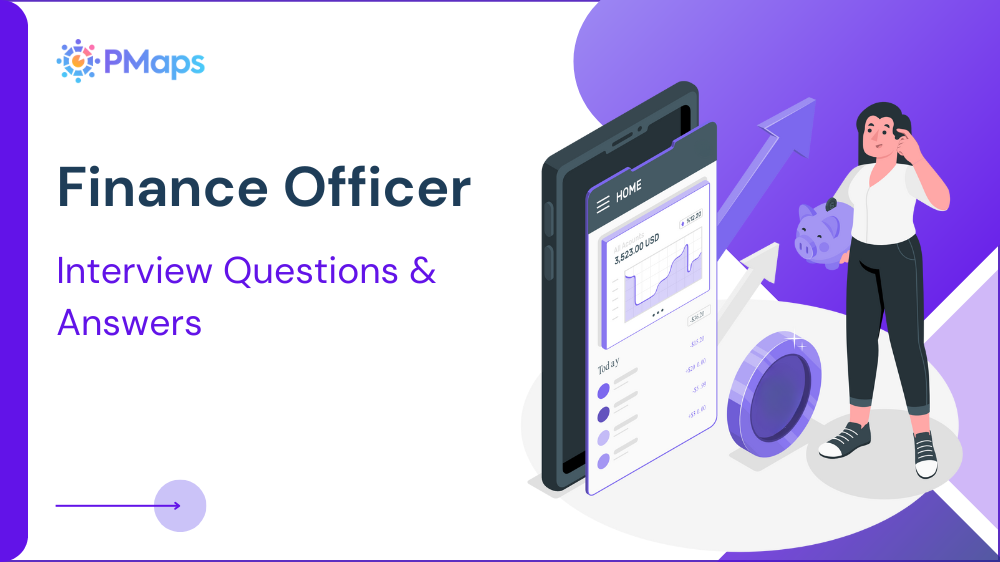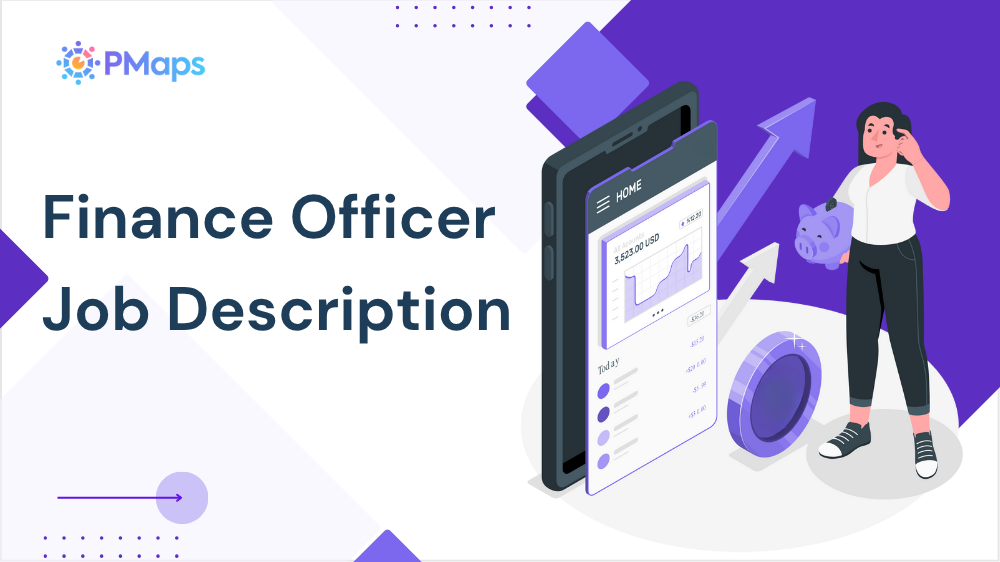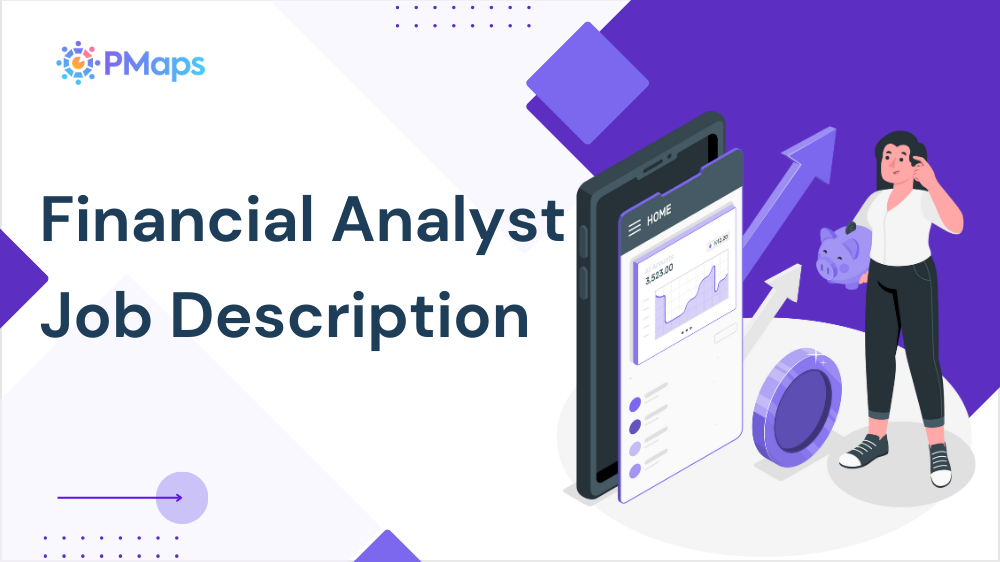
Inaccurate financial reporting is one of the top five internal risks faced by companies, according to a 2024 Deloitte survey. Hiring a finance officer who can manage compliance, cash flow, and financial integrity is vital for long-term sustainability. The finance officer plays a strategic role—monitoring budgets, preparing reports, and ensuring fiscal accountability across departments.
Make confident choices—use the Finance Officer Assessment.

But beyond technical skills, this role demands judgment, attention to detail, and ethical consistency. This blog outlines carefully curated finance officer job interview questions and answers to help you assess not just accounting knowledge, but also business acumen, regulatory familiarity, and decision-making. Here’s what you’ll get:
- Foundational and general finance questions
- Behavioral and situational interview prompts
- Technical questions for accounting systems and compliance
- Pro tips for evaluating finance talent
Quick recap—check the Financial Analyst Job Description once more.
General Interview Questions for Finance Officer
General interview questions set the foundation for assessing a candidate’s alignment with the core responsibilities of financial reporting, control, and compliance. These finance officer job interview questions help identify how well a candidate understands the scope, expectations, and critical thinking required for the role.
Sample Candidate Answer: I’m drawn to the finance officer role because it balances precision with responsibility. I enjoy working behind the scenes to ensure reporting integrity and regulatory compliance. To meet tight deadlines, I follow a fixed month-end close checklist and collaborate with stakeholders in advance to avoid last-minute errors.
Here are five essential questions to begin the evaluation:
1. What attracted you to the finance officer role?
What it Assesses: Career motivation and role understanding
What to Listen For: Candidates should reference interest in financial control, compliance, reporting accuracy, or budget strategy—not just “working with numbers.”
2. How do you define the responsibilities of a finance officer in a mid-sized company?
What it Assesses: Role clarity and strategic awareness
What to Listen For: Budget planning, reporting, audit coordination, cash flow management, and regulatory compliance.
3. How do you prioritize tasks when managing tight month-end reporting deadlines?
What it Assesses: Time management and attention to deadlines
What to Listen For: Use of checklists, financial calendars, automation tools, and proactive communication with teams.
4. How do you ensure accuracy in financial reports?
What it Assesses: Detail orientation and process rigor
What to Listen For: Reconciliation methods, review cycles, peer checks, and documentation processes.
5. What steps do you take to stay current with financial regulations?
What it Assesses: Compliance and continuous learning
What to Listen For: Subscriptions to financial updates, attending webinars, and referring to guidelines from authorities like IFRS or local regulators.
These foundational finance officer job interview questions help you gauge a candidate’s strategic understanding and operational preparedness early on. Next, we’ll evaluate how they’ve responded to financial challenges in real-world scenarios using behavioral questions.
Behavioral Interview Questions for Finance Officer
Finance officers are custodians of accuracy, integrity, and fiscal discipline. While technical knowledge can be tested through assessments, behavioral interview questions help uncover how candidates have responded to real-world risks, audits, budgeting conflicts, or discrepancies.
These structured questions evaluate ethical reasoning, pressure-handling, communication clarity, and accountability—qualities that are essential but not always visible on a resume. When assessing candidates, listen for outcomes grounded in both policy adherence and sound judgment.
Sample Candidate Answer: In a previous role, I noticed a recurring variance in vendor payments across two cost centers. After tracing the issue, I discovered duplicate data entries from a manual reconciliation. I escalated it, proposed using a digital reconciliation tool, and set up a secondary approval layer. Within one quarter, financial errors dropped by over 35%, and our audit score improved.
Here are five behavior-based finance officer job interview questions and answers that offer deep insight into candidate integrity and performance maturity:
1. Tell me about a time you identified a financial discrepancy. What steps did you take, and what was the outcome?
What it Assesses: Integrity, vigilance, and corrective action
What to Listen For: The best candidates show ownership of identifying and resolving discrepancies. Look for a methodical approach—spotting anomalies, validating records, escalating transparently, and implementing preventive controls.
2. Describe a time when you managed an audit under tight deadlines. How did you ensure accuracy and compliance?
What it Assesses: Planning and audit preparedness
What to Listen For: Responses should reflect early preparation, timeline mapping, stakeholder collaboration, and zero-defect documentation. Candidates who talk about last-minute fixes or blame show poor foresight.
3. Can you recall a time you had to explain complex financial data to non-finance colleagues or leadership?
What it Assesses: Financial communication and stakeholder collaboration
What to Listen For: Candidates should be able to translate numbers into decision-useful language. Use of dashboards, summaries, and real-life analogies shows maturity in cross-functional influence.
4. Share an experience where you had to push back on an unrealistic departmental budget request.
What it Assesses: Fiscal responsibility and negotiation skill
What to Listen For: Look for structured dialogue—use of data, historical spends, and projected impact. Strong finance officers balance assertiveness with collaboration, avoiding passive approvals or hard rejections.
5. Tell me about a time you introduced a control or process that improved financial accuracy or reduced errors.
What it Assesses: Initiative and risk control orientation
What to Listen For: Ideal responses describe spotting inefficiencies and proposing scalable solutions—like reconciliation checklists, approval hierarchies, or audit trails—with quantifiable outcomes.
Behavioral insights are invaluable in finance hiring. They uncover whether candidates are merely task executors or financial stewards capable of safeguarding compliance, influencing business units, and improving internal controls over time. Up next, we’ll explore situational questions designed to test a candidate’s thinking in unfamiliar, high-pressure, or judgment-based scenarios.
Situational Interview Questions for Finance Officer
While behavioral questions explore past decisions, situational interview questions assess how candidates think when faced with new, unfamiliar financial challenges. These scenarios reveal their analytical depth, ethical reasoning, and response agility—especially when outcomes are undefined or time-bound. Situational prompts are particularly useful for evaluating judgment, risk assessment, and strategic response in budget shortfalls, audit flags, or cash flow emergencies.
Sample Candidate Answer: When I noticed a 20% budget overrun, I traced it to overtime costs. I discussed it with the department head, proposed phased cost control, and updated our forecast. The deviation was flagged early, and corrective actions were initiated to prevent further slippage.
Here are four high-value finance officer job interview questions built around realistic case-style prompts:
1. Your quarterly budget review reveals a 20% overspend in a non-critical department. What steps would you take next?
Why Ask This: Tests budget discipline and stakeholder engagement
What to Listen For: Look for structured steps—root cause analysis, department meeting, realignment of forecasts, and policy-based corrective action. Avoid candidates who rush to cut without context.
2. You’ve discovered that a vendor invoice was approved without matching documentation. How would you handle it?
Why Ask This: Assesses control mindset and escalation maturity
What to Listen For: Candidates should avoid blame and instead focus on validation, cross-checking PO and GRN, informing leadership, and initiating process corrections.
3. A new department head insists on using outdated reporting formats that slow down month-end closures. How do you respond?
Why Ask This: Evaluates influence and process advocacy
What to Listen For: Look for tactful education, demonstration of efficiency benefits, and collaborative rollout of newer tools—not forced enforcement.
4. Senior leadership requests a financial forecast for a product launch in a volatile market. You have incomplete data. What do you do?
Why Ask This: Tests strategic thinking with ambiguity
What to Listen For: Look for triangulation—using historical data, market proxies, assumptions modeling, and transparency about limitations. Strong candidates always disclose what’s missing.
These situational questions differentiate reactive responders from proactive planners. They also help uncover how well a finance officer collaborates with operations while staying grounded in fiscal responsibility. Next, we’ll explore technical and role-specific questions to validate software fluency, compliance alignment, and accounting accuracy.
Technical or Role-Specific Interview Questions for Finance Officer
A finance officer’s credibility depends on their command over accounting tools, reporting accuracy, and regulatory compliance. These technical finance officer job interview questions help validate how candidates manage controls, generate insights, and ensure financial integrity.
Sample Candidate Answer: I’m proficient in SAP and Tally, and I use Excel for variance analysis. My budgeting process includes reviewing historicals, gathering input from department heads, and building a forecast with buffer margins. For reporting, I follow a strict close checklist and peer validation before submission.
Here are five role-specific questions to evaluate their technical depth and financial judgment:
1. Which accounting software and tools are you proficient with?
What it Assesses: Software fluency and digital readiness
What to Listen For: Names like Tally, SAP, QuickBooks, or Oracle. Look for comfort with Excel, reporting dashboards, or automation plug-ins.
2. How do you ensure that monthly financial reports are both accurate and audit-ready?
What it Assesses: Reporting accuracy and governance
What to Listen For: Use of checklists, reconciliations, sign-off cycles, and validation protocols.
3. What internal controls do you believe are essential for minimizing financial risk?
What it Assesses: Risk thinking and controls mindset
What to Listen For: Segregation of duties, approval hierarchies, automated alerts, and reconciliation processes.
4. How familiar are you with compliance frameworks such as IFRS, GAAP, or local tax laws?
What it Assesses: Regulatory awareness
What to Listen For: Direct exposure to filings, audits, or policy applications. Candidates should cite specific experiences, not textbook definitions.
5. Describe your process for preparing a departmental budget from scratch.
What it Assesses: Forecasting ability and cross-functional coordination
What to Listen For: Data gathering, past spend analysis, alignment with business goals, and justification strategies.
These technical finance officer job interview questions and answers help separate operational thinkers from task followers, especially when it comes to accuracy, audit preparedness, and financial tool usage.
Pro Tips for Interviewing Finance Officers
Hiring a finance officer goes beyond reviewing credentials. It requires identifying professionals who are not only detail-focused but also capable of maintaining regulatory standards and partnering cross-functionally. Here are five practical tips to enhance your interview effectiveness:
Budget controls slipping? Understand how to hire a Finance Officer who reviews spending with discipline.
1. Align each question with the Finance Officer Job Description
Start by reviewing the core KPIs—budget accuracy, audit readiness, and compliance handling. Build your interview scorecard around these role outcomes, not just resume checkpoints.
2. Include documentation review tasks
Share a sample ledger, financial statement, or report format. Ask the candidate to spot inconsistencies or suggest improvements. This tests both technical accuracy and judgment in real-time.
3. Test compliance instinct with scenario questions
Present borderline situations like duplicate payments or non-standard approvals. Look for ethical reasoning, not just textbook knowledge of policy.
4. Probe for finance-business collaboration experience
Ask how they’ve worked with operations or marketing teams. Strong finance officers help departments understand the “why” behind numbers and guide them to smarter decisions.
5. Use a Finance Officer Test to validate skills objectively
Assess forecasting, reconciliation accuracy, regulatory awareness, and decision-making under pressure. It’s the most reliable way to reduce bias and increase hiring precision.
Conclusion
A finance officer holds more than just numbers—they hold the foundation of business trust. From ensuring compliance to enabling confident forecasting, this role demands precision, discretion, and strategic clarity.
The targeted finance officer job interview questions and answers provided here help you assess technical competence, behavioral consistency, and ethical judgment. To go one step further, complement your interviews with objective tools that validate practical finance capabilities.
Need help streamlining finance recruitment? Explore our pre-employment finance assessments or connect with our team directly at 8591320212 or assessment@pmaps.in









